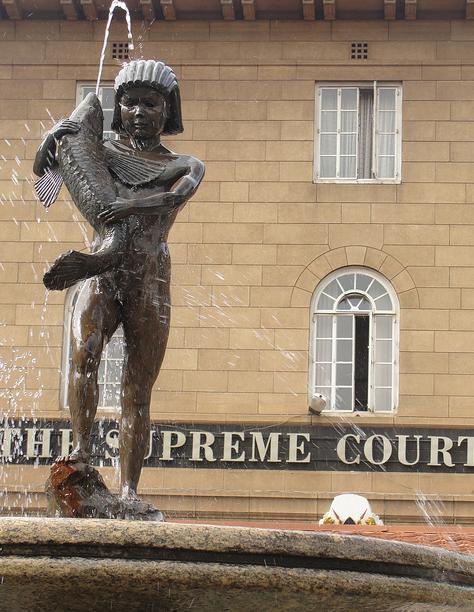Interpretation of Intellectual Property Rights in Kenya's Constitution: Lessons from Supreme Court Advisory Opinion on the One-Third Gender Rule
- Victor Nzomo |
- December 28, 2012 |
- CIPIT Insights
It is true the constitution will present the courts with inconsistencies, grey areas, contradictions, vagueness, bad grammar and syntax, legal jargon, all hallmarks of a negotiated document that took decades to complete. It reflects contested terrains, vested interested that are sought to be harmonized, and a status quo to be mitigated. These features in our constitution should not surprise anybody, not the bench, or the bar or the academia. What cannot be denied, however, is we have a working formula, approach and guidelines to unravel these problems as we interpret the constitution. We owe that interpretative framework of its interpretation to the Constitution itself. – W. Mutunga, CJ, Supreme Court of Kenya, Advisory Opinion No. 2 of 2012.
On 10th October 2012, the Attorney General sought the Supreme Court’s advisory opinion on one notable issue: Whether Article 81(b) as read with Article 27(4), Article 27(6), Article 27(8), Article 96, Article 97, Article 98, Article 177(1)(b), Article 116, and Article 125 of the Constitution of the Republic of Kenya require progressive realization of the enforcement of the one third gender rule or if it requires the same to be implemented during the general elections scheduled for 4th March 2013.
This month, the Supreme Court delivered its Advisory Opinion on the issue raised above, in which the majority view supported progressive realisation of the gender equity rule and whereas a dissenting view in the minority argued for immediate realisation of the constitutional rule. The four Supreme Court judges in majority namely Justices Tunoi, Ojwang, Wanjala, Ndungu were of the opinion that the gender equity principle in Article 81(b) of the Constitution is a statement of aspiration and would only transform into a specific, enforceable right after it is supported by a concrete normative provision.
In arriving at this majority view, the following statement was made:
“The word “shall” in our perception, will translate to immediate command only where the task in question is a cut-and-dried one, executed as it is without further moulding or preparation, and where the subject is inherently disposable by action emanating from a single agency.”
This blogger will now comment on what such a statement means to other parts of the Constitution, particularly in relation to the intellectual property provisions of the Constitution. In light of the Advisory Opinion, how would the word “shall” be interpreted in the context of promotion and protection of intellectual property rights? As many may know, there are three intellectual property provisions in the Constitution, which will be re-stated below for ease of reference:
Article 11.
(2) (c) The State shall promote the intellectual property rights of the people of Kenya.
Article 40.
(5) The State shall support, promote and protect the intellectual property rights of the people of Kenya.
Article 69.
(1) (c) The State shall protect and enhance intellectual property in, and indigenous knowledge of, biodiversity and the genetic resources of the communities;
In the Majority view of the Advisory Opinion, the four judges used the example of the composition of the Judicial Service Commission (JSC) to illustrate why the word “shall” in certain contexts must not be interpreted as giving an immediate order. In the context of the JSC membership requirements, the Constitution requires that there be 3 women representing various stakeholders. Holding everything else constant, this means that out of a total of 12 members of the JSC, it is guaranteed that there will be 3 women members. However this measure does not reach the required 1/3 minimum threshold set by the Constitution therefore, the State is obligated by the Constitution intervene in such cases. Therefore, the majority view was that the realization of a female membership for the JSC, of three, was immediate; but the attainment of the number of four is progressive, being dependent on the State’s further action.
In regards to the intellectual property provisions, this blogger submits that the onus would be on the State to show why the realisation of the rights guaranteed in Article 11, 40 and 69 must be realised progressively and not realisable immediately. However, the Supreme Court in this Advisory Opinion has made an important departure from human rights jurisprudence by refusing to accept that it is only socio-economic rights that require progressive realisation. According to the learned judges, it is not the classification of a right as economic, social, cultural, civil or political that should be used to determine its mode of realisation but rather the inherent nature of the right.
However it can be argued that the use of the word “shall” in the equality right context can be clearly distinguished from the context of the State’s obligations in respect to the protection and/or promotion, support of intellectual rights. In the case of IP rights, the provisions only require that the State act within its existing structures and mechanisms to give effect to proprietary rights that are already in existence. Therefore the use of the word “shall” is clearly mandatory in nature as it seeks to compel the State to act in a manner that secures and guarantees the enjoyment of a right expressly recognised by the Constitution. With reference to the intellectual property provision contained in Article 11, it is clear that the State’s obligations are both immediate and progressive. This article gives the State until 27th August 2015 to come up with a law that ensures communities receive compensation for use of their traditional knowledge, indigenous seed and plant varieties as well as recognising and protecting the communities’ ownership therein. As we have discussed here previously, the process of coming up with this law is on-going. Furthermore the Constitution is clear that the duties and responsibilities vis-a-vis the intellectual property rights of Kenyans are to be collectively shared between the IP-specific agencies already in existence and all other government organs concerned.

